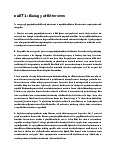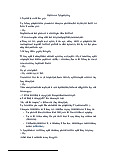




Preview text:
-
A person who won’t read has no advantage over one who can’t read – WEEKLY READING LOG Name: Le Thi Thuy TU Week: 1 Topic: changing the career
Type of material source: online articles/ books/ newspaper (circle one)
Title: 10 Steps to a Successful Career Change
Author: BY MIKE PROFITA Summary: (50 words)
People seek to change careers for many different reasons. Your career goals or values
may have changed; you may have discovered new interests that you would like to
incorporate into your job, you may wish to make more money, or have more flexible
hours, just to name a few. There are some tips forr you who planing for the move to new
job can make a successful career change. Reflection: (100 words)
Changing the job is not the simple decision. Bainstorming is always different from the
actual plan. So we will easily fail if we don't come up with a good career changing
strategy. After experiencing the author's article, I give my perspective, there are about
useful tips to give you confidence when changing jobs after. First all, you need to valuate
your current job satisfaction. Assessing your interest, values and skills are essential.
Find out as much as you can about those fields and reach out to personal contacts in
those sectors for informational interviews. If you don't try, you will not know you can do it
or not? For example, if you're interested in working with animals, volunteer at your local
shelter. The last one is looking for ways to develop new skills in your current job which
would pave the way for a change.
The way I find the material useful
* Useful vocabulary/ structure/ expression (with your own example) Vocab: Evaluate (v) đánh giá
Example: It's impossible to evaluate these results without knowing more about the research methods employed. Alumni (n) cựu sinh viên
Example: a reunion of Yale alumni of the class of 1990
In-depth reseach: nghiên cứu chuyên sâu.
Example: The committee has ordered an in-depth study of juvenile crime.
Coming up with : nảy sinh ý tưởng với…
Example: He came up with the idea of dividing the rooms in half.
Preliminary (adj, n): dự bị
Exmaple: The preliminary results are very positive.
10 Steps to a Successful Career Change BY MIKE PROFITA
Interested in a new career? People seek to change careers for many different reasons.
Your career goals or values may have changed; you may have discovered new interests that
you would like to incorporate into your job, you may wish to make more money, or have more
flexible hours, just to name a few.
Before you decide, it is important to take the time to evaluate your present situation, to explore
career options, to decide if your career needs making over, and to choose a career that will be more satisfying for you. Why People Change Careers
There are many different reasons why people want to change careers. Of course, it's a personal
decision with many factors involved. Joblist's Midlife Career Crisis survey reports on the top five
reasons people change careers:1 Better Pay: 47% Too Stressful: 39% Better Work-Life Balance: 37% Wanted a New Challenge: 25%
No Longer Passionate About Field: 23%
The Benefits of a Career Change
The Joblist survey reports that most people were happier after they made the change:1 Happier: 77% More satisfied: 75% More fulfilled: 69% Less stressed: 65%
In addition, the people who change careers were making more money. Survey respondents who
changed careers for better pay earned an additional $10,800 annually compared to their previous positions.
10 Steps to a Successful Career Change
Review these tips for assessing your interests, exploring options, evaluating alternative career
paths, and making the move to a new career
1. Evaluate your current job satisfaction. Keep a journal of your daily reactions to
your job situation and look for recurring themes. Which aspects of your current job
do you like and dislike? Are your dissatisfactions related to the content of your
work, your company culture or the people with whom you work? While you're doing
this, there are some things you can do at your current job to help you prepare to
move on when it's time for a change.
2. Assess your interests, values, and skills. Review past successful roles,
volunteer work, projects and jobs to identify preferred activities and skills.
Determine whether your core values and skills are addressed through your current
career. There are free online tools you can use to help assess career alternatives.
3. Consider alternative careers. Brainstorm ideas for career alternatives by
researching career options, and discussing your core values and skills with friends,
family, and networking contacts. If you’re having difficulty coming up with ideas,
consider meeting with a career counselor for professional advice.
4. Check out job options. Conduct a preliminary comparative evaluation of several
fields to identify a few targets for in-depth research. You can find a wealth of
information online simply by Googling the jobs that interest you.
5. Get personal. Find out as much as much as you can about those fields and reach
out to personal contacts in those sectors for informational interviews. A good
source of contacts for informational interviewers is your college alumni career
network. LinkedIn is another great resource for finding contacts in specific career fields of interest.
6. Set up a job shadow (or two). Shadow professionals in fields of primary interest
to observe work first hand. Spend anywhere from a few hours to a few days job
shadowing people who have jobs that interest you. Your college career office is a
good place to find alumni volunteers who are willing to host job shadowers.
Here’s more information on job shadowing and how it works.
7. Try it out. Identify volunteer and freelance activities related to your target field to
test your interest e.g. if you are thinking of publishing as a career, try editing the
PTA newsletter. If you're interested in working with animals, volunteer at your local shelter.
8. Take a class. Investigate educational opportunities that would bridge your
background to your new field. Consider taking an evening course at a local college
or an online course. Spend some time at one day or weekend seminars. Contact
professional groups in your target field for suggestions.
9. Upgrade your skills. Look for ways to develop new skills in your current job which
would pave the way for a change e.g. offer to write a grant proposal if grant writing
is valued in your new field. If your company offers in-house training, sign up for as
many classes as you can. There are ways you can position yourself for a career
change without having to go back to school. 10.
Consider a new job in the same industry. Consider alternative roles within
your current industry which would utilize the industry knowledge you already have
e.g. If you are a store manager for a large retail chain and have grown tired of the
evening and weekend hours, consider a move to corporate recruiting within the
retail industry. Or if you are a programmer who doesn't want to program, consider
technical sales or project management.
……………………………………………………………………………………………………..




